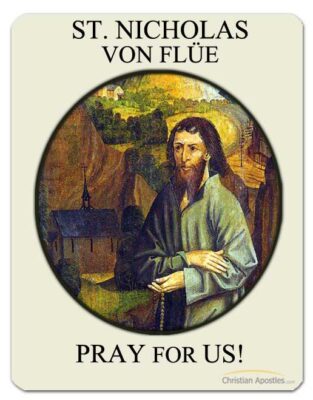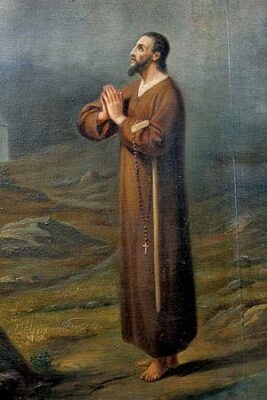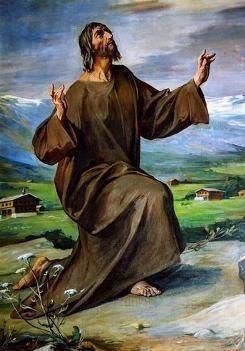Saints
St. Nicholas von Flüe – Savior of Switzerland
 All saints are similar in their great love of God, but they differ widely in the missions which God entrusted to them. St. Nicholas von Flüe had a mission that was unique: he was the Savior of Switzerland. Without Nicholas, it seems certain that there would be no Switzerland today, at least no Switzerland as we know it. Nicholas was born March 21, 1417, near beautiful Lake Lucerne in Unterwalden.
All saints are similar in their great love of God, but they differ widely in the missions which God entrusted to them. St. Nicholas von Flüe had a mission that was unique: he was the Savior of Switzerland. Without Nicholas, it seems certain that there would be no Switzerland today, at least no Switzerland as we know it. Nicholas was born March 21, 1417, near beautiful Lake Lucerne in Unterwalden.
Unterwalden was one of three forest cantons that had formed a league for mutual defense. The other two were Uni and Schweiz. The league soon grew into the Swiss Confederation. Nicholas’ parents were Henry and Emma von Flüe. Henry was a well-to-do peasant in a canton where all the people were peasants. He was influential and respected. Both Nicholas’ parents were devout in the practice of their religion.
St. Nicholas von Flüe’s Love for God
Young Nicholas, like most boys of his time, did not learn to read or write. But he learned to love God, and he learned to think, and he learned to take a great interest in the government of his canton. These forest cantons were direct democracies. Every male citizen took part in the assembly which decided important matters and which chose the officials for the coming year. From the age of four teen Nicholas attended the assembly and voted. He soon acquired a reputation for integrity and shrewd intelligence,
Despite his love of peace, Nicholas fought in two wars. Both were against Austria, which was a constant threat to Swiss liberty. He distinguished himself on the field and rose to be captain. Often it was his influence that spared churches, convents, women, children, and prisoners. Once he saved a monastery in which the Austrians had barricaded themselves. On this occasion, Nicholas prayed before a crucifix and then begged the Swiss not to storm the monastery.
St. Nicolas’ von Flüe’s Commitment to Civil Service
“If we wait three days, the Austrians will evacuate their position,” he promised. The Swiss waited, and the prophecy was fulfilled, Between the wars and after the wars, Nicholas worked on the family farm. When he was thirty years old he married Dorothy Wiss, the sixteen-year-old daughter of a neighboring farmer. The couple lived in a house not far from his father’s. During the next twenty years, ten children were born to them, five boys and five girls.
During these years, too, Nicholas was elected to a succession of political offices. He could have been made landmann, highest office in the canton, but he would not accept the post. Nicholas was a cheerful, hard-working man, friendly to all. He must have taken part in the games and dances or he would not have been as popular as he was.
But there was another side of his character. From early youth he practiced severe mortifications and spent long hours in prayer. As a boy, he fasted every Friday; later he increased this to four days a week. On these days he ate nothing but a piece of bread or a few dried pears. His wife and children knew that he often rose while they were asleep and prayed before a crucifix in the living room. Sometimes he would keep a vigil in the woods, or by the river, or in the village church. With little food and little rest he was able to perform his arduous duties as farmer, soldier, and public official.
The last public office held by Nicholas was that of judge. A case came before the court involving a poor man who had borrowed money from a wealthy neighbor and had pledged his garden as security. By hard labor and sacrifice the poor man was able to save enough money to pay the debt. The creditor, however, wished to own the garden and pretended he had bought it.
Nicholas, who was one of the judges, left his seat in order to plead the cause of the poor man. The other judges would not listen to reason, for they were big property owners and favored the rich. After the unjust verdict, Nicholas expressed his opinion in no uncertain terms before the other judges. Then he retired from public life.
St. Nicholas von Flüe the Hermit
 Two difficult years followed. During this time Nicholas felt that God was calling him to give up everything he held dear on earth and become a hermit. He argued with himself: Could God be calling him away from his family? He discussed the matter with his confessor and with the parish priest. Both agreed that the call was from God. But how could he leave his dear ones? On the other hand, how could he resist a call from God?
Two difficult years followed. During this time Nicholas felt that God was calling him to give up everything he held dear on earth and become a hermit. He argued with himself: Could God be calling him away from his family? He discussed the matter with his confessor and with the parish priest. Both agreed that the call was from God. But how could he leave his dear ones? On the other hand, how could he resist a call from God?
He knew that the family would be well provided for if he left. The older boys were fully grown and able to run the farm. His own father, Henry von Flüe, still lived and could advise the young people. But what about his wife, Dorothy, who had just borne his tenth child? He must have her consent if he was to become a hermit. Dorothy had observed her husband’s anguish and was not surprised when he spoke his mind to her. She agreed to his leaving her and the children, the youngest who was four months old. She knew that this was the will of God, and that she must not oppose it.
So St. Nicholas departed from his home and his loved ones on October 16, 1467. God had not revealed to Nicholas where he should go so he assumed that he should go far from home. He decided to join other hermits who lived in Alsace. On the way there, as he slept behind a hedge, a brilliant light flashed upon him. The light pierced his body, causing him extreme pain, and leaving him with the conviction that he must be a hermit in his homeland. The place where he should live was made known to him: it was about a fifteen minute walk from his home. This experience left Nicholas unable to eat or drink for the rest of his life, except for taking Holy Communion.
St. Nicholas von Flüe’s Simple Life as a Hermit
Retracing his steps, Nicholas reached his farm after dark. He did not make his presence known but slept in the barn behind his home and slipped away before daybreak. At the place that had been indicated to him he threw up a shelter of boughs. This was his first heritage. On Sundays and holidays Nicholas assisted at Mass in the parish church. Going and returning he passed his own house, but he never went in or even looked that way.
Nicholas wore a habit of rough brown material, and he wen barefoot at all seasons. He slept two or three hours a night on log and spent the rest of the night in prayer. He was cheerful and friendly, as he had been in his days as a farmer. He has been described as a tall, slim, wiry person; he had bright eyes, a well. shaped nose, excellent teeth. His hair was thin and he had a short beard.
Bringing Others To God Through His Example
At first the people of Unterwalden were shocked by Nicholas action. How did he dare go off and leave his wife and children? It was not long before the hostility changed to veneration. The people noticed that Nicholas went without food and drink, and they took this as a sign of God’s approval. Nicholas himself would never admit that he did not eat or drink, always giving evasive answers when questioned about it. But the people of the district kept watch for forty days to see if Nicholas was receiving any food and they found that he was not.
The neighbors built a small but substantial hermitage for “Brother Claus” as they called him. In a few years they added a chapel which joined his cell in such a way that he could look into the sanctuary through a narrow opening and assist at Mass without leaving the cell. During the last ten years of his life Mass was celebrated daily in the chapel.
People came to assist at Mass and remained afterward to hear Nicholas speak to them from his window. The crowds became so large that the authorities had to make regulations to control them. Nicholas gave excellent advice, some of it based on knowledge not given by the visitors. He told a jealous wife, for example, that she was wrong in suspecting that her husband was involved in an affair with a neighbor. Among those profiting by his advice were his own wife and children, who came to him regularly.
The Swiss Confederation won a great victory over Charles the Bold, Duke of Burgundy. This victory almost ended the Confederation. For some time there had been friction between the forest cantons and the urban cantons. During the war, the urban cantons of Lucerne and Zurich had made alliances outside the Confederation. Now they were demanding the lion’s share of the booty captured from the Burgundians, and they wished to have their allies, Freiburg and Soleure, admitted to the Confederation.
The forest cantons Aatly refused to admit the proposed new members because they would increase the power of the urban cantons. Representatives from the various cantons met in a conference which began at Stans on December 18, 1481. The representatives could not agree, and it looked as if a civil war might result. If the cantons became divided against each other it was probable that all of them would be swallowed up by powerful neighbors. The very existence of Switzerland was at stake.
St. Nicholas von Flüe Saves Switzerland from Civil War
 In a last desperate effort to preserve peace and unity, the parish priest of Stans, Heini Amgrund, hurried Nicholas’ hermitage and spent the night consulting with the hermit. When the priest arrived back in Stans in the morning he found the members of the conference dispersing in anger. He begged them to reassemble and to hear the advice of Nicholas. The delegates knew that Nicholas was a saintly man who had the good of Switzerland at heart, and they agreed to reassemble.
In a last desperate effort to preserve peace and unity, the parish priest of Stans, Heini Amgrund, hurried Nicholas’ hermitage and spent the night consulting with the hermit. When the priest arrived back in Stans in the morning he found the members of the conference dispersing in anger. He begged them to reassemble and to hear the advice of Nicholas. The delegates knew that Nicholas was a saintly man who had the good of Switzerland at heart, and they agreed to reassemble.
Nicholas proposed that Frieburg and Soleure be admitted to the Confederation, but that all the cantons be free to rule as they pleased in local matters. This plan would strengthen the Con- federation by adding two cantons and it would also protect the forest cantons from domination by the urban cantons. Nicholas also proposed that no canton should be allowed to make alliances outside the Confederation. This plan was hailed by the delegates and adopted as the Agreement of Stans.
Civil war had been avoided, and the bonds between the cantons had been so strengthened that they have lasted through the centuries. In the century after Nicholas, the Protestant Revolt divided the people as far as religion is concerned, but the unity of the country survived this blow. Three languages – German, French, and Italian – are spoken in the little country, but this has proved barrier to unity. Switzerland stands as an example to the world that people of different religions and different languages can work together in peace and harmony and without sacrificing liberty and democracy.
Lasting Legacy
Nicholas had been told in a vision that he would die on his seventieth birthday. A few days before this birthday he contracted his first and last illness. His last sufferings were short, but they were intense. He suffered agonizing torments of the body, and his condition was such that he could not lie down but must always be moving. He also suffered a great darkness of the soul. He was able, however, to speak to visitors and to receive the last sacraments. He died, as had been foretold, on his seventieth birthday – March 21, 1487.
Immediately after his death Nicholas was venerated as a saint in his canton. He was not canonized until 1947. The canonization came at an appropriate time. By that time Switzerland had remained neutral and had preserved its independence during two World Wars that had spread devastation among its more powerful neighbors. Thanks to the work of Nicholas, the Swiss people had been spared the horrors of the two greatest wars in history. No wonder that Nicholas von Flüe has been named chief patron of Switzerland.
OTHER SAINTS OF THE SAME NAME:
- St. Nicholas Bara (or Myra), fourth century. Bishop. “Santa Claus.” Feast Day: December 6.
- St. Nicholas Tolentino, 12451305 Augustinian friar noted for his successful preaching. Feast Day: September 10.
